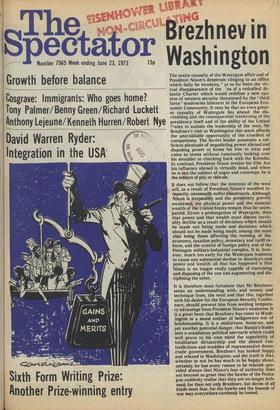The major casualty of the Watergate affair and of President
Nixon's desperate clinging to an office which daily he weakens, ',s so far been the virtual disappearance of the 'ea of a redrafted Atlantic Charter which would redefine a new system of western security threatened by the 'third force' tendencies inherent in the European Economic Community. It may be that an even greater casualty of Watergate lies ahead: the discrediting and the consequential weakening of the presidency itself and of the ability of the United states to sustain the leadership of the west. Mr Brezhnev's visit to Washington this week affords the unavoidable opportunity of the cruellest of comparisons. The Soviet leader possesses a sufficient plenitude of negotiating power abroad and disposing power at home for him to treat and come to terms without constantly looking over his shoulder or checking back with the Kremlin. In contrast, President Nixon retains his title, but his influence abroad is virtually dead, and when he is not. the subject of anger and contempt, he is the subject of pity or ridicule.
It does not follow that the interests of the west will, as a result of President Nixon's manifest incapacity, necessarily suffer disastrously. Although Nixon is irreparably and the presidency gravely weakened, the physical power and the material wealth of the United States remain thus far unimpaired. Given a prolongation of Watergate, then that power and that wealth must almost inevitably decline as a result of decisions which should be made not being made and decisions which should not be made being made, among the most vital being those affecting• the running of the economy, taxation policy, monetary and tariff reform, and the control of foreign policy and of the Pentagon military-industrial complex. It is, however, much too early for the Watergate business to cause any substantial decline in America's real power and wealth: all that has happened is that Nixon is no longer really capable of exercising and disposing of the one and augmenting and disciplining the other.
It is therefore most fortunate that Mr Brezhnev seeks an understanding with, and money and technique from, the west and that this, together with his desire for the European Security Conference, should prevent him from seeking temporary advantage from President Nixon's weakness. It is a great boon that Brezhnev has come to Washington in a mood neither of belligerence nor of brinkmanship. It is a misfortune, however, and yet another potential danger, that Russia's leader sees a scandalous political spectacle which could well prove to his own mind the superiority of totalitarian dictatorship and the absurd contradictions and muddles of representative democratic government. Brezhnev has looked happy and relaxed in Washington; and the truth is that, whether or not he has much to be happy about, certainly he has every reason to be relaxed: provided always that Nixon's loss of authority does not become so great that the hawks of the Pentagon suddenly realise that they are no longer tethered; for then not only Brezhnev, but doves of all kinds must fear, for the hawks and the hounds of war may everywhere carelessly be loosed.


































